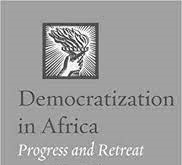Course information

This course covers the basic principles, theories, conceptual tools, and comparative methods useful for understanding the challenges of democracy and democratization. It begins by discussing the analytical concepts and indicators suitable for comparative policy research into democratic governance. This is followed by alternative explanations for the underlying drivers of democratization; the constitutional designs most conducive to strengthening processes of democratization; and roles of civic society, political culture, religion and social capital. The course concludes by reflecting on the consequences of democratic governance for prosperity, welfare and peace.
- Facilitator: George Abel Mhango
